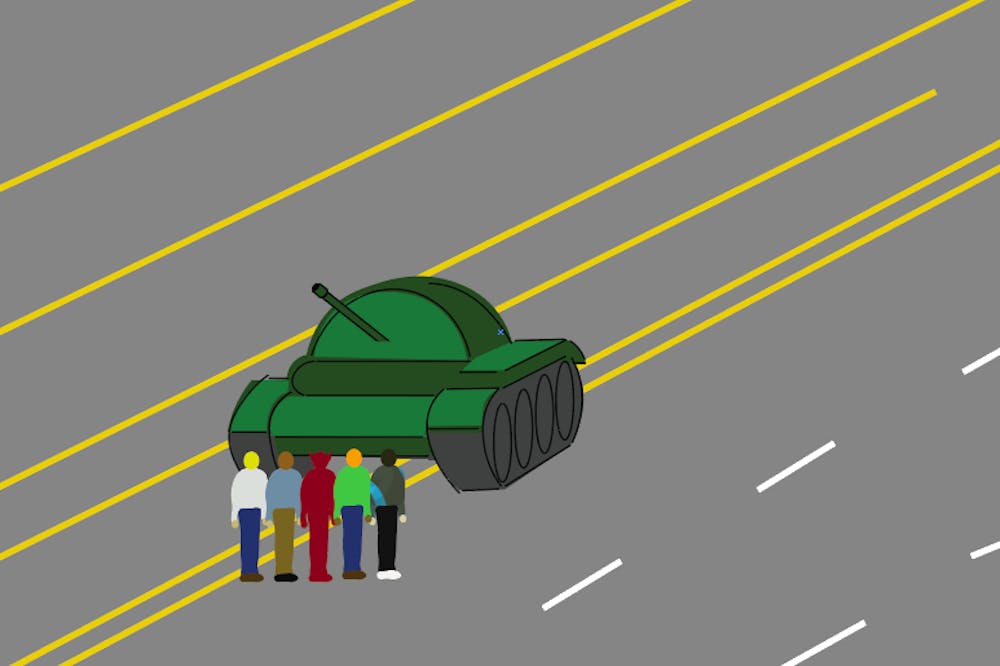After the Saudi and Emirati coalition military has displaced three million in Yemen, President Donald Trump wants to go beyond the U.S.’s tacit support of providing illegal weapons and bring the US into the conflict. Only students can stop this.
Student activism has been at the heart of directly attacking governments and war crime-friendly corporations where it hurts: their bottom lines. It’s time to take up better grassroots organizing against war and target U.S. firms for boycotts as a central part of student organizing.
The U.S. has abdicated its work as a human rights leader. Regardless of Obama’s mixed record on humanitarian issues, he diminished support for the Saudi-led military coalition by stopping some weapons deals and denounced Syrian President Bashar al-Assad’s use of chemical weapons.
Within the past week, President Trump has announced interest in a direct military partnership with the Saudi-Emirati coalition in Yemen and just today his Secretary of State, Rex Tillerson, initially gave no comment with regards to yesterday's chemical weapons attack in Khan Sheikhun in Syria’s northwestern Idlib Province.
BREAKING: Secretary of State Tillerson ignores question when asked for response to chemical attack massacre in Syria.
— Peter Alexander (@PeterAlexander) April 4, 2017
The attacks on Yemen, as an asymmetrical bombing campaign by the Saudi and Emirati government against the Houthi rebels who control most the nation, have displaced three million, killed ten thousand and will likely leave the nation in the grip of a famine for years to come.
Previous U.S. involvement in Yemen has focused on removing Al-Qaeda in the Arabian Peninsula, which uses the rural parts of Yemen as a stronghold. Attacking Houthi rebels alongside other Peninsular governments represents a significant upscaling of U.S. work in the region.
With a president that wishes to grow the military-industrial complex, there is no better place for students to step in than Phoenix.
Home to major military supply manufacturing centers like Boeing, Phoenix is a hub for everything from munitions to the helicopter that killed about 30 civilians — including a U.S. citizen’s young daughter with no due process — in a botched raid in Yemen during the first week of the current presidency.
This community is intrinsically linked to the human rights violations occurring in the Arabian Peninsula, and so it has a moral responsibility to act up in response.
Felina Rodriguez, ASU junior studying political science and Spanish literature and culture, is president of United Students Against Sweatshops (USAS). USAS has previously organized boycotts of organizations selling products made in exploitative conditions, including official ASU sportswear from Nike, Russell and Jansport sold at the ASU Student Bookstore. She considers boycott organizing one of the fundamentals of grassroots activism.
“It’s a slow escalation. We start with informing the people and letting them decide whether or not they boycott the material. Then we build momentum. We start a petition to inform more and more people and organizations what’s happening. Then you send letters and continue to build coalition momentum. It should build up, where you’re talking with a whisper, and then you’re talking with a regular voice, and then you’re shouting,” Rodriguez said.
The movement must be wider than the University alone. On that matter, organizers can follow in the steps of anti-Apartheid organizers and call for their compatriots from Phoenix to Phnom Penh to get involved.
While companies like Boeing represent powerful targets, student organizing networks should be the bedrock for a coalition.
The coalition attacks on Yemeni civilians have gone underreported and largely ignored by the rest of the world. War is a global effort, and the weapons used in Yemen are produced in places accessible by students to protest, denounce, and advocate against.
If the global community has abdicated its role in protecting humanity, students must take their place and enforce international law through any means necessary.
Felina Rodriguez will be presenting on organizing actions at ASU’s Womanity 2017: Activism in Motion conference on the Slow Escalation Model on the afternoon of April 8, 2017.
Reach the columnist at benjamin.steele@asu.edu or follow @blsteele17 on Twitter.
Editor’s note: The opinions presented in this column are the author’s and do not imply any endorsement from The State Press or its editors.
Want to join the conversation? Send an email to opiniondesk.statepress@gmail.com. Keep letters under 500 words and be sure to include your university affiliation. Anonymity will not be granted.
Like The State Press on Facebook and follow @statepress on Twitter.




